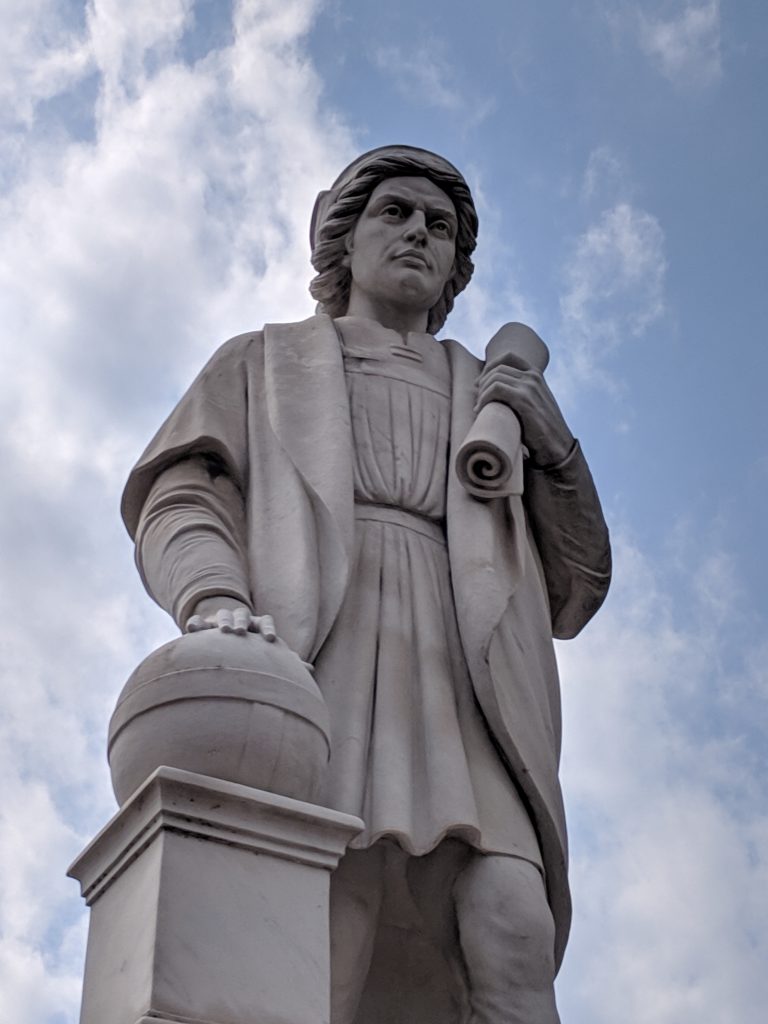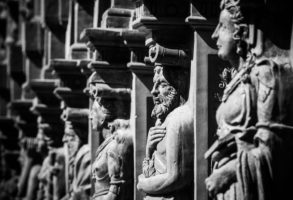
Published October 12, 2020
While many Americans will find Columbus Day a nice respite during this intense election season, a look at headlines in the press may prove exhausting. The memorial has become a flashpoint for historical revisionism over the last thirty years. This likely means another cycle of stories claiming that Columbus was evil and the intrusion of Western civilization into the New World is to be regretted. Responding to this frenzy of historical revisionism over the last few years, multiple states and the District of Columbia have dropped Columbus Day in order to celebrate Indigenous Peoples’ Day.
Such critics are not faithful to the historical record. They make the mistake of assuming that the goods of political and social life, developed over millennia in Western civilization, were present in the Americas in the days before Columbus arrived. Some critics tell a story wherein the Americas were pristine, pure, and good until Europeans showed up — a secular Garden of Eden. Others concede that the arrangements preceding Columbus’s arrival were not idyllic but still insist that the Americas would have been just fine without Columbus’s arrival and the evils he brought with him.
To put it lightly, the historical record makes it far from clear that the New World was a natural paradise. For instance, explorers quickly discovered that some native tribes practiced cannibalism and human sacrifice, which — it hopefully goes without saying — cut against the basic natural law belief in the fundamental equality and dignity of all human beings that is foundational to America.
War between tribes was also ubiquitous in the New World prior to the arrival of the Europeans, so much so that Europeans relied on hostility between tribes as a military asset of their own. The Spanish conquistador Hernán Cortes, for instance, won the Battle of Tenochtitlan (i.e. Mexico City) in 1521 against the Aztecs and their revered leader, Montezuma, partly because he held together a military alliance of tribes that had resented the Aztecs for years before he arrived. Evidently, passions in the heart of man are the same everywhere; they are not particular to this or that civilization. It is the question of how to tame, shape, and direct those passions — not any natural endowment — that determines a civilization’s character.
No human society has ever been unblemished precisely because human nature is imperfect. This is why the discoveries of human accountability to the law, rational political debate, and the ordering of man’s passions through religious devotion and education are so vitally important. Undoubtedly, these are innovations of the West. Discovered in ancient Greece and Israel, refined in Rome, and incubated through the formation of Europe and the dawning of modernity, when Columbus lived, these social innovations were not — and are still not — present across much of the globe. For all its faults, Western civilization brought these elements of social life to the Americas — and the world.
It is impossible to know what the Americas would look like today had Columbus not made his voyages. However, the material fact that he could engage in such far-sighted voyage and endeavored to do so were themselves the result of individual daring, scientific rationality, and commercial ingenuity — qualities characteristic of Western civilization that would come to define both the New World and the new American nation. Columbus himself was a devout Catholic but many of his fellow Catholics in Spain and the New World, including the Dominican friar Bartolomé de las Casas, argued against his often cruel treatment of the natives (he was no more lenient in his treatment of fellow Spaniards). Indeed, in response to Spain’s encounter with the natives, Las Casas and fellow Spanish theologians formed one of the first modern doctrines of human rights and the responsibilities of nations to each other — another proud inheritance of American civilization.
While America’s political formation owes much to the British tradition of parliamentary debate and religious liberty, of course, the country’s character also owes a great deal to the adventurous spirit of Columbus, as well as the tradition of human rights, shaped in Europe, that Columbus’ critics now use to attack him.
Critics miss this because they see Columbus and Western civilization as evil intrusions into the New World. Yet America would not exist today without Columbus and the spirit he passed on. Depending for their security and prosperity on the very civilization they claim to indict, today’s critics manipulate the Western traditions of intellectual dissent and free speech to smear a man whose daring was the first step in bringing these traditions to the New World.
Columbus’ legacy is as important as ever today because it reminds us that historical accuracy and public honor are not mutually exclusive. While recognizing Columbus’s imperfections, we can also honor the good he passed down to us. Refusing to do so says more about critics’ idealistic vision of a world emancipated from human frailty than it does about the man known as The Admiral — or about the virtuous civilization handed down by Europe to America.
Ian Lindquist is a Fellow at the Ethics and Public Policy Center in Washington, D.C.





